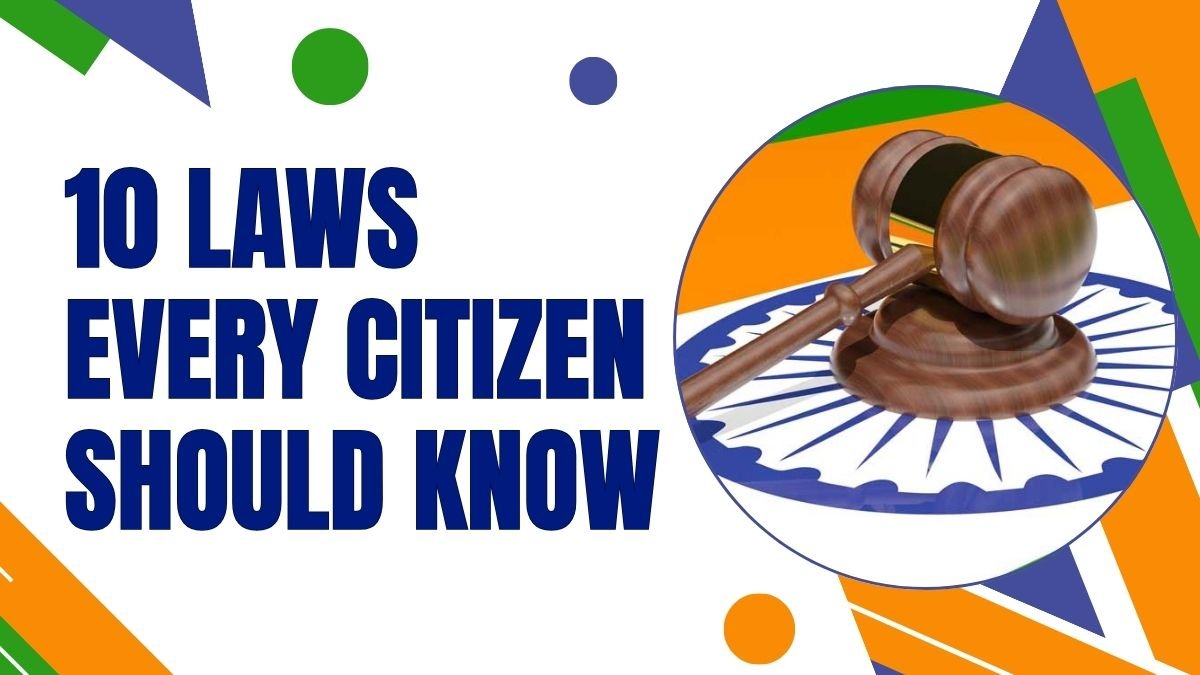The Indian Constitution and laws are designed to maintain a balance between security, rights, and duties in every citizen’s life. Often, people are not fully aware of their rights and legal provisions, making it difficult to access justice. Therefore, it is essential that every citizen be familiar with their rights and some key laws. Here, we will discuss 10 laws and provisions that every Indian should know.
1. Article 21: Right to Life and Personal Liberty
Article 21 is a fundamental provision of the Indian Constitution that guarantees every individual the right to life and personal liberty. This right protects any person from death, arrest, or deprivation of physical liberty without due process of law. It is considered the most important human right for citizens. Under this article, citizens have the power to protect their lives and make independent decisions, allowing them to live their lives with dignity and respect.
2. Maternity Benefit Act, 1961
The Maternity Benefit Act is specifically designed to protect pregnant women. This law prohibits employers from dismissing or treating a female employee unfairly due to pregnancy. Under this law, female employees are entitled to a fixed period of paid leave and other benefits. This act provides women with security and equal opportunities at the workplace and helps them balance their family and professional lives.
3. Consumer Protection Act
The Consumer Protection Act aims to protect citizens from business injustice. This law gives consumers the right to receive fair compensation for defective products and services. Under this act, if a consumer experiences fraud, poor quality, or unfair practices in a product or service, they can file a complaint in court. This law makes consumers aware of their rights and ensures business transparency.
4. Right to Information (RTI) Act
The Right to Information Act provides citizens the right to obtain information from government offices. This law promotes transparency and accountability. Under this law, citizens can seek information about any government decision, plan, or action and have the right to receive a response. The RTI Act is an important tool to prevent corruption and make citizens aware of their rights.
5. Motor Vehicles Act, 1988
The Motor Vehicles Act ensures road safety and traffic regulations. It prohibits drunk driving, speeding, and traffic violations and provides penalties for accidents. The police are also empowered to arrest drunk drivers without a warrant. This law ensures the safety of citizens on the road and helps enforce the rules.
6. Code of Criminal Procedure (CrPC), Section 46
Section 46 of the CrPC provides protection against the arrest of women. Under this, it is prohibited to arrest a woman at night (6 pm to 6 am), except in certain circumstances and with the permission of a magistrate. This provision ensures the safety and dignified treatment of women.
7. CrPC, Section 51(2)
Under Section 51(2) of the CrPC, a woman must be searched only by a female officer. This law is crucial for protecting a woman’s dignity and respect. However, some exceptions are made for serious offenders. By following this law, the police and other government officials respect women’s rights.
8. Indian Penal Code (IPC), Section 166A
Section 166A of the Indian Penal Code provides for penalties for a police officer refusing to register an FIR. Its purpose is to assure citizens that their complaints are not ignored. This law guarantees public safety and justice, protecting every citizen’s right to file a complaint.
9. Right to Free Legal Aid
The right to free legal aid is for citizens who cannot afford to hire a lawyer. This provision ensures that even poor or economically weak citizens can participate in the judicial process and that their cases are resolved fairly. Its purpose is to ensure universal access to justice and equality.
10. Hindu Marriage Act, 1955
The Hindu Marriage Act regulates marriage and divorce matters. It includes rules for marriage and divorce, such as applications for divorce within one year of marriage and relief in special circumstances. This law ensures justice in family matters and protects the rights of both men and women.
Conclusion
Citizens’ rights and legal protections are extremely important in India. The above 10 laws and provisions help every Indian citizen become aware of their rights and duties. Whether it’s the right to life and personal liberty, consumer rights, or the right to file a legal complaint, every citizen must be familiar with them. Knowledge of the law ensures security, justice, and respect.
If you know and understand your rights, you can ensure justice not only for yourself but also for society.
